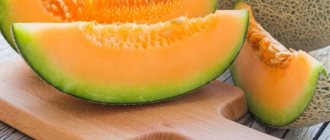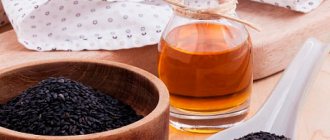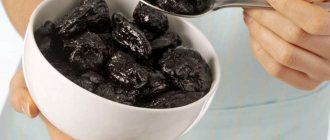Is it possible to eat peanut butter during pregnancy?
Peanuts and peanut butter are a favorite treat for many people. Nuts contain many useful vitamins and microelements. But is it possible to eat peanuts during pregnancy? Answering this question unequivocally is not as easy as it seems. There is no consensus among medical experts about whether peanut butter is good for the health of the expectant mother and her child. Let's talk in more detail about the benefits and harms of peanut butter for a pregnant woman's body.
View catalog
Calorie content and vitamin composition of peanuts
Do peanuts contain anything beneficial? Raw groundnuts contain 10.1 g of water and 9.9 g of carbohydrates per 100g. The calorie content of the nut is 551 Kcal per 100 g of raw peanuts, proteins 26.3 g; fats 45.2 g; carbohydrates 9.9 g. 300 g of this product contains the daily amount of calories required for a person.
The vitamins contained in peanuts are B1, B2, B3, as well as vitamin E and C. It is vitamin E that protects human cell membranes from the effects of free radicals and helps red blood cells move oxygen to other cells throughout our body, which is why it is called the source youth and beauty. Vitamin PP (nicotinic acid) is involved in the transformation of fats and carbohydrates into energy.
It participates in redox reactions. Vitamin C fights bacteria and strengthens the immune system. E1 prevents tumor formation and is a natural antioxidant. B5 activates brain performance and improves memory. The minerals that peanuts are rich in are potassium, calcium, phosphorus, sodium, iron and magnesium.
The calorie content of roasted peanuts is 626 Kcal, peanuts cooked in sugar have a calorie content of 569 Kcal, but salted peanuts are 634 Kcal. The calorie content of peanut butter reaches 670 Kcal; chocolate candy bars with added peanuts have a calorie content of 514 Kcal.
Is it possible to eat peanuts during pregnancy?
Peanuts are one of the most accessible nuts, although in general they are not a nut. During pregnancy, women are always drawn to unusual foods with rich taste. Peanuts are used in the manufacture of various delicious desserts; pasta and halva are made from it; groundnuts are also included in chocolate bars. Despite certain disadvantages of this product, in general gynecologists do not prohibit its use during pregnancy.
Peanuts contain a large amount of vitamins and nutrients. These elements will have a positive effect on the body of both mother and baby. This product contains protein. This is both a building material for the baby and a source of energy for the mother. The components included in its composition increase blood clotting, which is important during childbirth.
In 1st trimester
The first trimester of pregnancy is the period from the very last menstruation and the subsequent 13 obstetric weeks. This period is a very important and responsible time period in the life of the expectant mother. All the baby’s organs and systems are formed, the placenta is formed - the organ through which all the nutrients for the baby, as well as oxygen, will be delivered.
In the early stages, toxicosis appears and manifests itself as decreased appetite, vomiting, and sometimes increased salivation. A woman’s taste preferences change dramatically, expectant mothers are drawn to “salty foods,” this problem can be solved with the help of a small package of salted peanuts.
In the 2nd trimester
The second trimester of pregnancy lasts from the 13th to the 27th gynecological week. The expectant mother leads an active lifestyle, as her belly allows her to walk, visit the pool, and play sports. During this period, she feels the first movements of her child. The baby completes the formation of all important body systems. You can already find out his future gender, his bone tissue is actively growing and his skeleton is already strong and durable. In the second trimester, when the baby begins to actively develop, the expectant mother definitely needs to be prescribed a vitamin and mineral complex.
B9 contained in peanuts, also known as folic acid, is very important in the process of gestation; it participates in the formation of the neural tube of the embryo and helps its further development. In addition, peanuts are a source of monounsaturated fat. Iron is responsible for hemoglobin levels and prevents anemia.
With the help of potassium, water balance is maintained, blood pressure is normalized, manganese lowers glucose, participates in the normalization of the thyroid gland, and stimulates the formation of connective tissue in the fetus and the development of its skeleton. Magnesium has a positive effect on the nervous system of the expectant mother and helps minimize the effects of stressful situations. Zinc is involved in building protein bonds.
In the 3rd trimester
The third trimester is the final stage of bearing a child. Women are allowed to take prenatal leave so that they can rest and gain strength before giving birth. During this period, hormonal levels affect the psycho-emotional state of the expectant mother, her sleep is disturbed, tearfulness appears, and her gait changes due to changes in the curvature of the spine.
During this period, it is necessary to further strengthen control over nutrition and continue taking the vitamin-mineral complex. All problems include problems with both increased and decreased pressure. The change in pressure occurs due to the fact that carrying a child puts a huge strain on the mother’s organs. At risk are women who were diagnosed with anemia before pregnancy or suffered from vegetative-vascular dystonia. And also if a pregnant woman is overweight.
The consequence of poor nutrition of the expectant mother can be anemia; a practicing vegetarian, an expectant mother who is too young, or pregnant women who suffer from heart defects are also at risk of developing it.
If you had excessively heavy menstruation before pregnancy. In the third trimester, many women begin to develop cramps in the lower extremities, especially at night. This indicates a lack of magnesium and potassium in the body. In this case, peanuts for pregnant women can also help.
Properties of peanuts for pregnant women
In general, peanuts are very beneficial for the expectant mother. Its elements protect it from the effects of free radicals and remove toxins unchanged, help with toxicosis, help reduce cholesterol levels, prevent cramps of the lower extremities, help fight insomnia, help reduce nervous tension, normalize the psychological state during pregnancy , are involved in strengthening blood vessels and increasing hemoglobin levels. Peanuts have a beneficial effect on the skin, increasing its elasticity and helping to prevent stretch marks.
Benefit
Peanuts during pregnancy can be both harmful and beneficial . Folic acid helps renew cells and normalize liver activity. With the help of nicotinic acid, the membranes of nerve cells are restored. Peanuts replenish the body's reserves of tryptophan, which is responsible for the quality of sleep and the production of the hormone of joy and happiness, serotonin. There is a slight choleretic effect.
Undoubtedly, roasted peanuts are less healthy, but they have a rich taste and aroma. Salted peanuts or peanuts prepared with added butter and sugar have an even worse effect on the body. But during heat treatment, the content of polyphenols, a natural antioxidant, increases in peanuts, and roasted peanuts have a longer shelf life. During roasting, a film appears that protects the nut from loss of vitamins. The fats that make up Peanuts have a slight choleretic effect, so they are very useful for people who suffer from peptic ulcers and gastritis.
If you include groundnuts in your diet, they will help strengthen memory, improve hearing, and improve concentration. This product contains natural antioxidants. They provide the human body with resistance to the harmful effects of free radicals. Compounds such as polyphenols help him in this. They prevent the development of heart disease, and also help in the prevention of cancer and delay premature aging.
Harm and contraindications
The harm that peanuts cause to the body is its calorie content, which leads to excess weight. It is worth considering that peanuts are a very allergenic product. To get Quincke's edema, it is enough to eat only a few things. If a woman is diagnosed with “varicose veins” or “thrombophlebitis” and there is an increase in platelets in the blood, then she should avoid consuming peanuts, since the product slows down the speed of blood flow through the vessels and thickens it. This product is also contraindicated for diabetes.
An allergic reaction to peanuts manifests itself in the form of severe itching and redness of the skin. In extreme severe cases, swelling of the larynx, eczema, and allergic urticaria appears. In addition, if peanuts were stored incorrectly and the humidity was not maintained, then aflatoxins can form in them, which harm the liver, and a harmful fungus can also form due to humidity.
Harm
This useful product has no small harm for the expectant mother and her baby. Excessive consumption of peanuts can lead to undesirable consequences. There are some diseases in which eating groundnuts and products containing them is strictly prohibited.
Why pregnant women should not eat peanuts:
- high calorie content can lead to the resumption of extra pounds. Obesity is considered very dangerous during pregnancy;
- groundnut is very difficult to digest, so heartburn, gas formation and bloating may occur, which increases pressure on the uterus;
- Eating salted peanuts is not recommended during pregnancy, as salt helps retain fluid in the body. This contributes to the resumption of swelling;
- blood flow slows down, this leads to insufficient oxygen supply to the placenta, and also provokes varicose veins;
- erucic acid tends to accumulate in the body and has a destructive effect on many organs.
Peanuts are on the list of one of the most allergenic foods. This may manifest itself as redness and itching of the skin. This will also affect not only the mother’s body, but also the child. At birth, the risk of diathesis increases.
It is better for late pregnant women to completely exclude peanuts from the diet if there are diseases such as diabetes, obesity, gout and stomach ulcers.
How and which peanuts to choose
Before you decide which peanuts to buy, you need to know that peanuts are divided into the following types:
- raw peanuts in shell,
- raw shelled peanuts,
- fried without skin and without shell,
- fried with skin without shell.
Peanuts that are sold without shells or skins are pre-heated before sale, a kind of blanching. It has a fairly high cost. The price depends on the packaging; peanuts can be sold either by weight or sorted into small bags. When purchasing beans, pay attention to their appearance.
If the package contains wrinkled, darkened grains, as well as there are cracks or stains on the surface of the shell, if there is debris among the nuts, if the contents of the package are foggy, then it is better not to take it. It is worth paying attention to ensure that all the beans are the same size. If you are going to store peanuts for a while, it is best to buy them in shells.
Walnut varieties vary in size and shape. For example, Indian peanuts are the smallest, but they have a very rich taste and the strongest aroma. Uzbek peanuts have the same qualities. Peanuts, grown in South and North America, are primarily used to make peanut butter. Argentine varieties are used in cooking.
general information
Peanuts are usually called groundnuts because of the way they grow, but from a botanical point of view this is incorrect: they belong to the legume family.
Peanut is a climbing annual plant whose shoots can reach 70 cm in length. The fruits of the plant are pods convex on both sides (larger than those of peas), inside them there are from one to 5 beans, the size of which can reach up to 2 centimeters.
There is a bright film on the surface of the nuts. After the formation of pods, the shoots begin to bend toward the ground, gradually growing into it, where final ripening occurs. The harvest is harvested by hand 4-6 months after planting.
The supposed homeland of groundnuts is South America, Peru. Archaeologists managed to find a vase resembling the fruit of this plant, decorated with ornaments in the form of nuts. The find dates back to a period when the region had not yet been discovered by Europeans.
From Peru, the fruits of the plant were exported to Europe. They were used as one of the foodstuffs during voyages, and on the mainland, peanuts became the basis for a drink reminiscent of coffee. Later, the groundnut came to Africa and China, where it became one of the staple foods of the local population. Now peanuts can be found on all continents; they are grown even in the southern regions of the CIS.
Initially, peanuts were used as a feed crop for farm animals, and the poor enjoyed eating them. Today, groundnuts are grown on an industrial scale and are used in the food, cosmetics, and medical industries.
Methods of use
Under no circumstances should an expectant mother eat for two. A large amount of vitamins and microelements can be obtained from a nutritious diet. Since the internal organs are compressed by the enlarging uterine bladder, they function in an enhanced mode, and therefore meals should be small and frequent, and peanuts are very good for snacking. Both raw and as a paste on sandwiches.
Roasted peanuts are consumed during snacks by guests. You can use peanut butter to make sweet sandwiches by spreading it on white bread on top of some jam. A salad with the addition of peanut beans is very unusual, when peanuts are added to finely chopped boiled chicken, diced avocado, a little onion and grated carrots. Everything is topped with soy sauce and sesame oil. Peanuts are very popular in cooking; they are used to decorate cakes and sprinkle cookies. It gives baked goods a rich taste.
Precautionary measures
Peanuts can be quite difficult to digest. Especially for people who have stomach diseases. In addition to its high calorie content, do not forget that food allergies to peanuts are the most common of all food allergies.
When choosing peanut butter, make sure that it contains only peanuts and salt. It is unacceptable to add any other oils or sugar to the composition, otherwise trans fats that are released from palm oil can harm a pregnant woman and lead to blockage of blood vessels. To reap the benefits of peanut butter , do not take more than 3 tablespoons per day.
Important! Peanuts should be consumed with caution if a woman suffers from asthma, as they can cause an attack and cause allergies. It is worth considering that raw peanuts cause constipation. Due to the fact that peanuts can very easily become moldy, you need to look very carefully, since moldy peanuts cause very serious harm to the body.
General information
Peanuts, often called groundnuts, are not a nut at all, but a legume. It is widely used as a fodder crop and is also a popular delicacy for many people.
It is dried, fried, eaten salted, with spices, or in a sweet glaze. Peanut fruits also serve as raw materials for the preparation of high-calorie vegetable oil, margarine, and chocolate.
Peanuts have a unique composition, are rich in vitamins, microelements, valuable amino acids, and are a source of antioxidants.
At the same time, as a high-calorie product and a strong allergen, it should be eaten with caution.
Peanuts - “Live Healthy!” program
Some useful tips on how to conceive a girl can be found in this article.
Stretch marks after childbirth: how to prevent and how to get rid of? The answer to the question is here.









